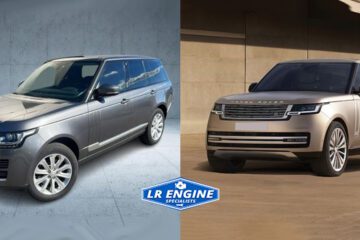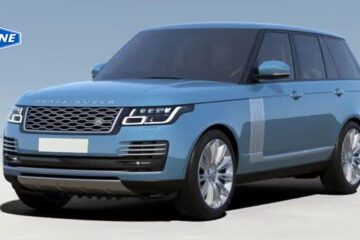Introduction:
The Range Rover 3.0 Diesel Engine Comparison is more than a fundamental analysis; it explores two of Land Rover’s most legendary powertrains. The Range Rover Vogue 3.0 l and L405 SDV63.0 ll Diesel represent an engineering turning point in luxury SUVS. Both engines deliver strength, refinement, and endurance; a closer look shows the specific strengths.
Understanding both models’ mechanical complexities and real-world performance is vital for buyers who value power, reliability, and fuel efficiency in a high-end SUV. While both engines share a 3.0-litre capacity, the fuel type, diesel versus petrol, creates a wide divergence in engine behaviour, longevity, torque delivery, and day-to-day usability.
Evolution of the Range Rover 3.0 Engines: A Diesel Legacy
Land Rover’s diesel offerings have long stood as a prime example of British engineering. The Range Rover L405 SDV6 3.0 l Diesel, part of the fourth-generation series, set a new benchmark for diesel luxury with its twin-turbo V6 engine. It was built with long-distance cruising, towing, and off-road control in mind.
On the other hand, the Range Rover Vogue 3.0 engine, available in both petrol and diesel formats, expanded its appeal to global markets. The petrol version offers effortless acceleration, designed according to urban and highway drivers, while the diesel variant delivers superior torque and range.
The difference between diesel and petrol in these two 3.0-l engines is more than a matter of fuel preference, it’s a statement about performance philosophy.
Power Delivery: Torque vs Throttle Response
At the core of this Range Rover 3.0 Diesel Engine Comparison is how each powertrain delivers its performance.
The L405 SDV6 3.0l Diesel engine is designed for high torque at low RPMS. It produces an ideal 600Nm of torque, allowing the vehicle to haul heavy loads with ease. The diesel V6 engine delivers a twin-sequential turbo system, guaranteeing powerful acceleration with minimal turbo lag. This engine is desirable among long-distance drivers who need consistent performance and maximum fuel economy.
In comparison, the Range Rover Vogue 3.0 petrol engine generates a higher top-end horsepower figure. It may not align with the torque output of its diesel counterpart, but it compensates with immediate throttle response, effortless revving, and quieter operation under load. For drivers who spend more time in cities or select spirited driving, the petrol variant provides a more dynamic experience.
The diesel Range Rover engines shine in off-road and towing capabilities, while the petrol versions excel in urban agility and smooth highway cruises.
Refinement and NVH: Diesel Gets Civilised
Diesel engines used to be well-known for their loud noise, vibrations, and rough performance. That period is long gone. The Range Rover L405 SDV6 3.0l Diesel is advanced, with sound-deadening technologies that keep the cabin serene even under stress. Active noise cancellation and the latest mounts reduce diesel clatter to a subtle purr.
Still, the Range Rover 3.0 petrol engine has an advantage in outright smoothness. Acceleration is quieter, idle is whisper-like, and engine noise is barely perceptible. If refinement is a main buying factor, the petrol engine has a benefit, but not a decisive one.
With advanced diesel engineering, the NVH gap has closed significantly. The diesel variant delivers peace and power in one package, specifically on long motorway journeys.
Emissions and Efficiency: Diesel Still Leads the Way
One of the most discussed aspects in the Range Rover 3.0 Diesel Engine Comparison is emissions versus economy.
The L405 SDV6 diesel engine offers better fuel economy under actual conditions. Drivers often report over 35 mpg on the highway, relying on driving style. With its latest AdBlue urea injection system, the SDV6 diesel complies with stringent Euro 6 emissions standards, minimising NOx emissions significantly.
The Vogue 3.0 petrol engine, though generating fewer particulates, normally uses more fuel. Owners can expect 23–27 mpg, which is respectable for its class but doesn’t match the diesel’s range or CO₂ performance.
This efficiency benefit makes diesel the desirable option for high-mileage drivers, those commuting long distances, or anyone demanding a vehicle that performs well while carrying heavy loads across different terrains.
Longevity and Maintenance: What Lasts Longer?
Generally, diesel engines are considered more reliable, especially in heavy-duty applications. The L405 SDV6 diesel engine uses a powerful cast iron block and features built for longevity, like steel pistons and low-friction bearings. These advancements translate to engines capable of reaching 200,000+ miles with proper care.
The petrol 3.0l V6, while not far behind in reliability, often experiences higher wear rates due to its higher operating temperatures and rev ranges. Maintenance gaps are similar between both engines, but diesel engines often have a longer lifespan before major services.
That said, diesel engines are more sensitive to fuel quality and need precise servicing. Use of low-quality diesel or skipping scheduled maintenance can result in expensive repairs like injector failure or DPF blockages.
Driving Dynamics: How Fuel Choice Shapes Ride Quality
Driving a Range Rover with a 3.0-litre petrol engine is an excellent experience, where gear changes feel smooth and throttle response is immediate. There’s a certain elegance to how power is delivered, especially on smooth roads or fast lanes.
The L405 SDV6 3.0-litre diesel feels more composed and calculated. It shines on inclines, uneven terrain, and in stop-start traffic. With adjustable air suspension and dynamic stability control, both models offer a pleasurable ride, but diesel surpasses when torque is needed on demand.
In high-altitude or low-traction environments, the diesel engine’s exemplary low-end torque provides better control and responsiveness, making it perfect for rural or off-road conditions.
Environmental Trends: Diesel Facing Pressure
Environmental strategy is shifting, and diesel engines are under increasing scrutiny. Urban low-emission zones and clean air rules in cities such as London, Paris, and Berlin are limiting diesel access. For city dwellers, the petrol Range Rover Vogue 3.0 may be more workable, offering cleaner emissions and fewer regulatory barriers.
However, Land Rover’s modern diesel technologies, containing selective catalytic reduction and diesel particulate filters, meet the latest emission standards, enabling them to remain viable in most regions for years to come.
In the broader market, diesel is not dead, it is transforming. It remains a smart option for those prioritising range, torque, and endurance.
Fuel Costs: Diesel Wins the Long Game
Diesel may cost a little bit more per litre in some markets, but the mileage per tank more than compensates. Over 50,000 miles, owners of the L405 SDV6 diesel will likely spend notably less on fuel compared to their petrol counterparts.
For fleet users, countryside commuters, and frequent drivers, diesel is still the more affordable long-term investment. With meticulous care and quality fuel, the diesel engine will outlast and outperform petrol in operational cost over time.
Verdict: Which 3.0l Engine Reigns Supreme?
The choice between the Range Rover Vogue 3.0 petrol and the L405 SDV6 3.0 l diesel relies on your lifestyle and driving priorities.
If your life is dominated by urban commuting, comfortable highways, and short trips, the petrol engine offers unmatched smoothness and excellence. It is better suited for environments where emissions regulations are stringent, and fuel economy is less of a concern.
If you live outside the city, tow frequently, or do long-distance drives, the diesel version delivers durability, torque, and efficiency that the petrol version cannot match. It’s the workable workhorse in a luxury coat, resilient, potent, and confident across any terrain.
Both engines show Land Rover’s commitment to intelligent engineering, but for those looking at overall value, diesel comes out slightly ahead in this comparison.
Conclusion:
In the world of luxury SUVS, the Range Rover 3.0 Diesel Engine Comparison shows the depth of engineering brilliance that Land Rover brings to its powertrains. Even if you choose the urban sophistication of petrol or the reliable capability of diesel, you’re driving a machine built to exceed expectations.
For those needing expert suggestions, parts, or servicing related to these legendary engines, LR Engine Specialists offers dedicated support and technical expertise. With a deep understanding of the 3.0-litre diesel and petrol platforms, they are the go-to resource for keeping your Range Rover running at excellent performance.
FAQs:
Which engine is more fuel-efficient, the diesel or petrol 3.0l?
The 3.0-litre diesel (L405 SDV6) is more fuel-efficient, often achieving over 35 mpg on highways. The petrol variant averages approximately 23–27 mpg, depending on driving conditions.
Is the diesel engine louder than the petrol version?
Modern diesel Range Rovers use the latest sound-deadening and are surprisingly quiet. However, the petrol engine is still smoother and quieter overall, particularly at idle.
Which engine lasts longer with proper maintenance?
The diesel engine normally has a longer lifespan due to its powerful components and lower RPM operation. Meticulous care can push it well beyond 200,000 miles.
Are there restrictions on driving diesel Range Rovers in cities?
Some urban areas impose low-emission zone (LEZ) restrictions on diesel vehicles. The L405 SDV6 complies with Euro 6 standards but may still experience limited access in stricter zones.
Which engine is better for off-road and towing?
The 3.0-litre diesel shines in off-road conditions and towing due to its high torque at low RPMS. It delivers excellent control and endurance across rugged terrains.


